Image
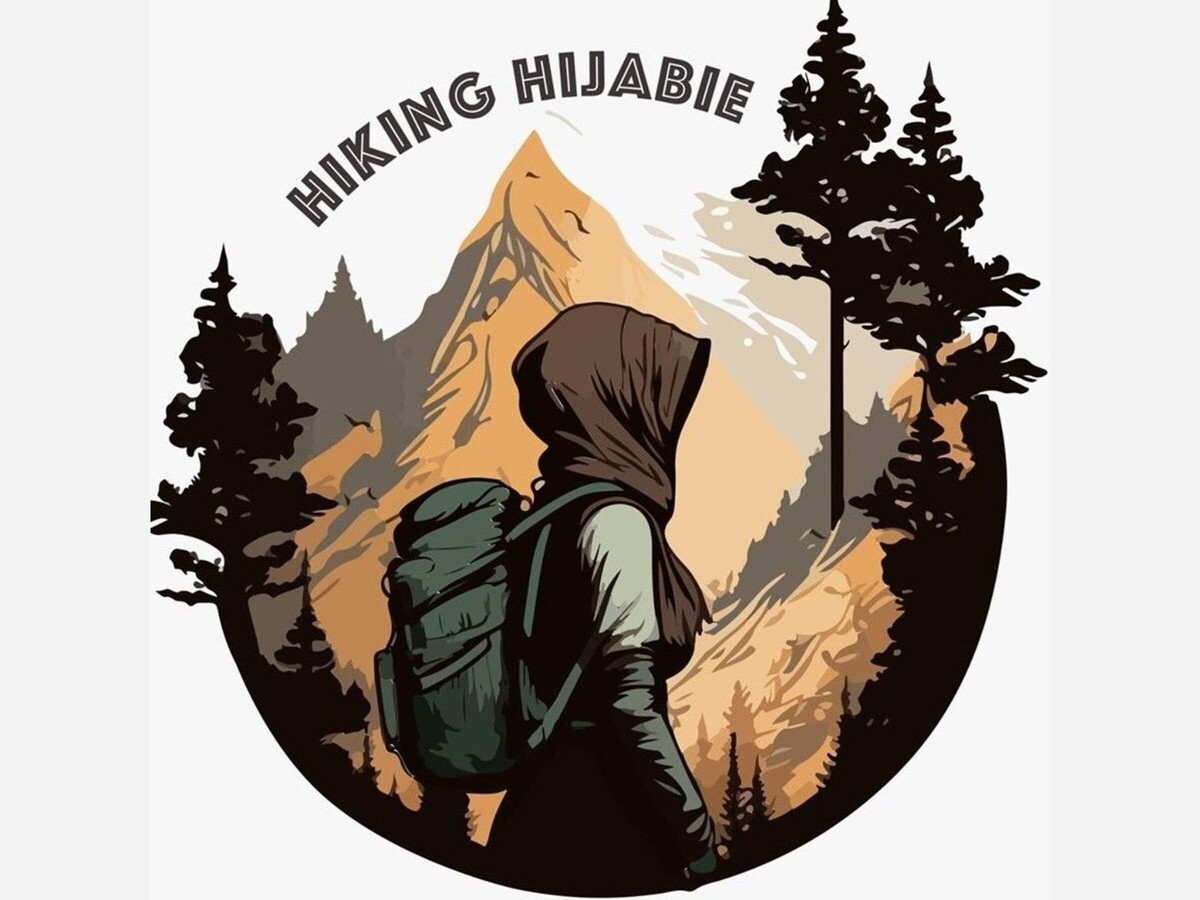
Guest: Nasrieen Habib
Interviewer: Tom Akaolisa
Occasion: Celebrating Muslim Women And The Contributions They Make To Our Communities
Editor’s Note: This interview was conducted in March 2025 in honor of Women’s History Month. At MinneapoliMedia, we believe women’s voices, leadership, and legacies deserve to be celebrated every month—not just in March.
Tom Akaolisa: Good morning! We're here with Nasrieen Habib, the visionary Founder & CEO of Eco Jariyah, a sustainable apparel company featuring the modest outdoor lines Hiking Hijabie and Hiking Ummah. Nasrieen is also the Founder & Executive Director of the Amanah Recreational Project, a nonprofit dedicated to creating inclusive, faith-rooted outdoor experiences for Muslim women and families. As part of our month-long features celebrating International Women's Month, we're thrilled to delve into your journey and the impact of your initiatives.
Tom Akaolisa: Nasrieen, what exactly does Amanah Recreational Project do?
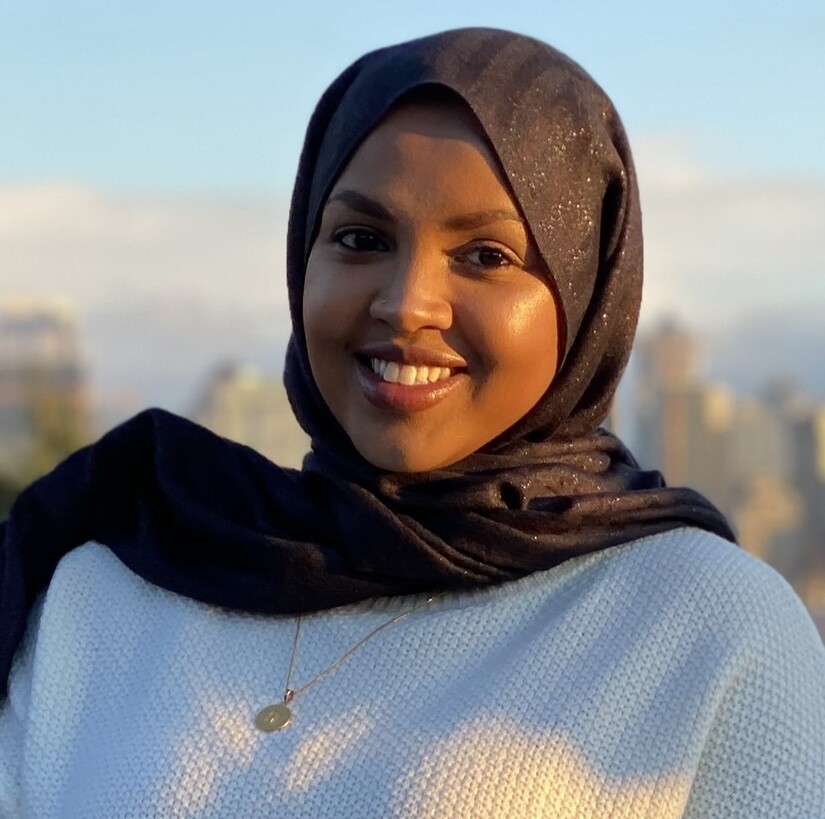
Nasrieen Habib:
Founder & CEO of Eco Jariyah;
Founder & Executive Director of the Amanah Recreational Project
Nasrieen Habib: Amanah Recreational Project is an outdoor organization focused on reviving Islamic values of stewardship through outdoor activities. We organize hiking, camping, and kayaking trips, and host workshops on topics like zero waste. Our core mission is to connect with nature through our Islamic faith, encouraging people to think deeply about resource consumption and its impact on communities in the Global South and low-income neighborhoods. We also encourage legislative engagement, urging people to vote for green bills, and to make conscious choices with their purchases—opting for sustainable or secondhand items to reduce demand for new goods and move away from hyper-consumerism. We want to inspire people to choose experiences over material possessions.
Tom Akaolisa: As part of International Women's History Month, can you share the personal journey that inspired you to found Hiking Hijabie and how your own experiences have motivated you to empower Muslim women in outdoor recreation?
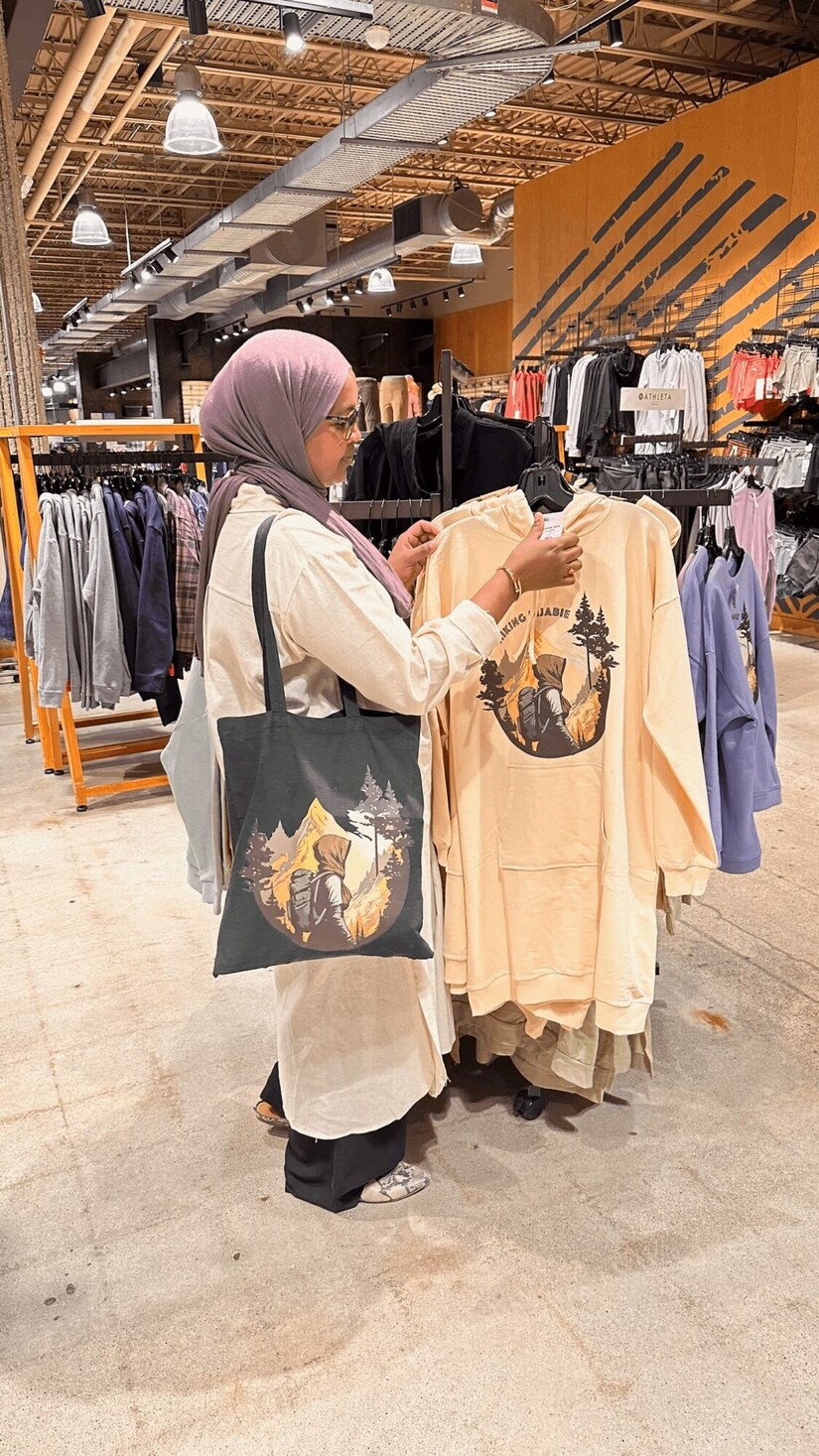
Nasrieen Habib: Wow, it's quite a story! I started Hiking Hijabie out of a personal need. I was born in Somalia, a place I loved, and due to the civil war, my family moved between Kenya, Uganda, and Ethiopia before we came to the U.S. in 1999 through sponsorship. Being outdoors has always been a part of my identity. Somalis are considered nomadic, and long-distance walking is almost in our DNA. Growing up, we walked everywhere; we didn't have cars or bicycles, so being outside was very natural for me.
After living in Houston for about 10 or 12 years, I moved here and experienced severe seasonal depression. My doctor suggested two options: medication or a holistic approach. I didn't want to get addicted to antidepressants, so I chose the holistic route. My doctor recommended spending time outside in the sun.
I already loved being outdoors, but the challenge was learning to dress for the weather. Coming from a hot climate and then living in Houston, adjusting to the winters here was really difficult. I realized I was wearing all the wrong clothing. Once I learned how to dress properly, I was outside all the time, even in winter, hiking with my kids year-round.
However, after the political climate shifted in 2016, I didn't feel safe going outside by myself. I'd try to convince my sisters in Eagan to walk with me in the mornings, but I live in North Minneapolis, so driving an hour back and forth every day just to feel safe and be in a community wasn't sustainable. That's when I decided to start a hiking group.
The first thing I did was create an Instagram account. I wanted it to be more than just a walk; my aspiration was to visit national parks. I saw many women who didn't look like me, predominantly white women, enjoying national parks with their families and friends, and I thought, "I want to do that for Muslim women."
My friend joked, "Is this really you, or did someone steal your identity?" because I already had another account called Hipster Hijabie. That account was focused on promoting environmental sustainability. After the drought and famine in Somalia in 2011, I helped Islamic Relief organize aid while still in Houston. Seeing those images deeply affected me and put environmental awareness at the back of my mind.
Later, in college, I took a sustainability class and learned about the environmental impact on the Global South, especially on women and girls. I read books like Half the Sky and The Story of Stuff, which detailed how products are made and their climate and human impact. Then, I sought to understand Islamic values of sustainability and found The Green Dean by Abdul-Matin. These books helped me gather enough information to share on my Hipster Hijabie account. I called it "Hipster Hijabie" because my friends and family would always say, "That's so hipster" or "You're so hippie" whenever I did something sustainable. So, I just owned it! I promoted composting, talked about cloth diapering for my kids, shared sustainable products, and discussed Quranic verses that encourage sustainable living. I also did speaking engagements and workshops in the community.
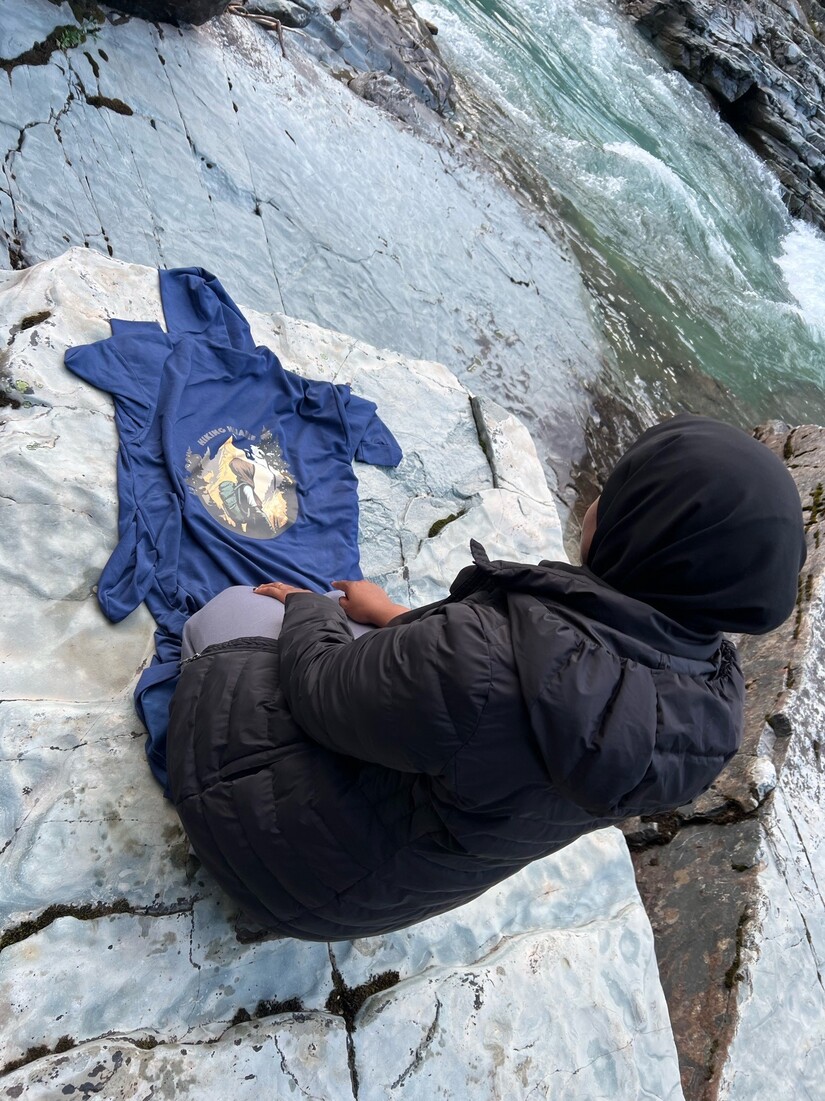
When I created the Hiking Hijabie Instagram, my friend initially thought it was a fake account because I used my picture instead of a logo. But I told her, "No, it's me! We're starting a hiking group." I invited people from my Hipster Hijabie account, and others found us. Our first public hike was on May 14, 2022, at Afton State Park. I just put out the time and location, not knowing who would show up, but eight other women and children did!
From that initial group, we created a WhatsApp chat. We decided to hike every Saturday at 10 AM, exploring different parks and trails. People shared the link, and by the end of that first month, we had nearly 100 people in the chat, many of whom came from a less active hiking group. My commitment was just two hours every weekend, and we saw the group grow rapidly. By the end of that year, we were close to 200 members.
That fall, I organized a hiking trip to Duluth for fall foliage. I initially booked four hotel rooms, but people kept booking, and we ended up with 50 women! We explored Lutsen and hiked at Jay Cooke State Park—it was a fantastic weekend getaway. This showed me that people wanted more than just hikes, so we started adding more activities.
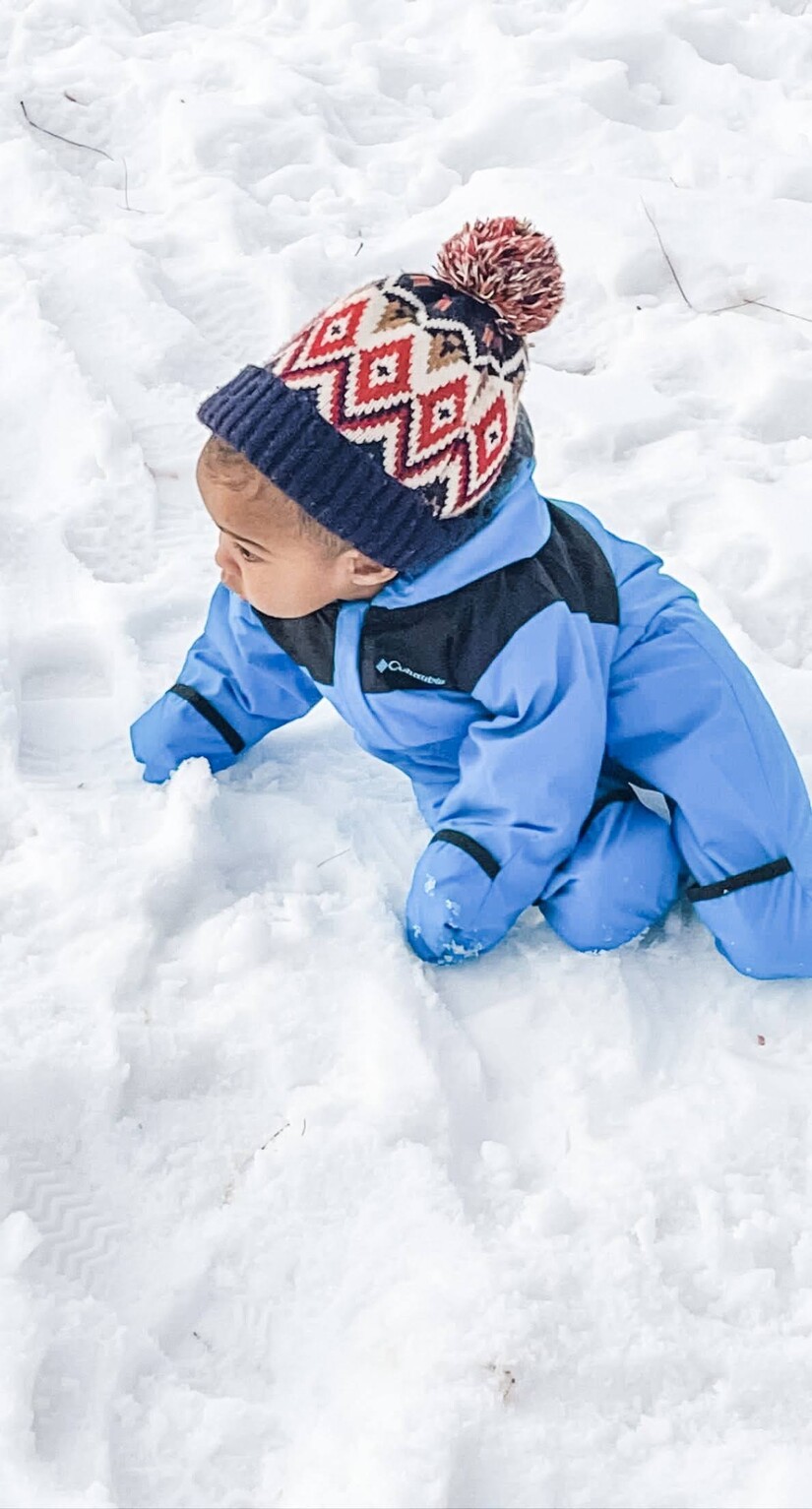
That winter, we introduced snowshoeing, snow tubing, and continued our winter hikes. Many people asked if we'd stop for winter, but I insisted we'd hike all year round, especially since winter was the reason I started being outdoors here! In the summer, we added kayaking and camping.
In February, we took our first national park trip to Arizona, visiting Sedona, Horseshoe Bend, and the Grand Canyon. It was too cold to hike much at the Grand Canyon, but it was an incredible experience, and we hope to go back to explore more. From there, we continued to add more activities, and the group kept growing.
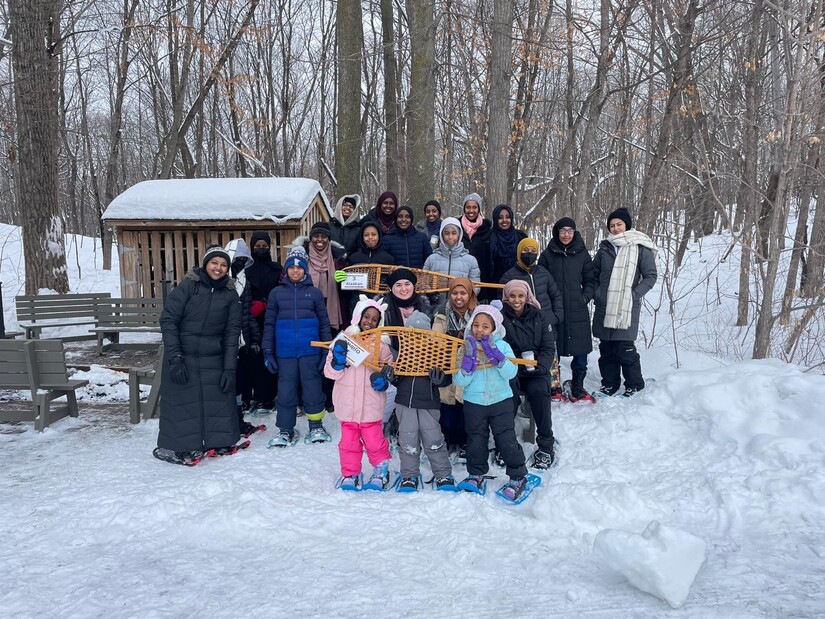
The following year, we expanded to include Hiking Ummah to engage brothers and families, creating a more inclusive space. We also added bike lessons through Three Rivers; I was part of the first cohort of women to learn to ride bikes for the first time! We continued with winter activities like bouldering (indoor rock climbing without ropes, but with safety cushions) and archery.
At the moment, our Hiking Hijabie group is over 750, but combined with the Hiking Ummah, we are over 900.
For a long time, everything was free, and it still largely is. I only charge fees if there's an external cost involved, as it wasn't meant to be a business. I asked the group for funding to create a logo because I didn't want my picture to be the main image on our Instagram. A friend offered to help, and using Midjourney AI, we spent a night creating our logo. I'd describe what I wanted, she'd input it, and we kept tweaking until we got it.
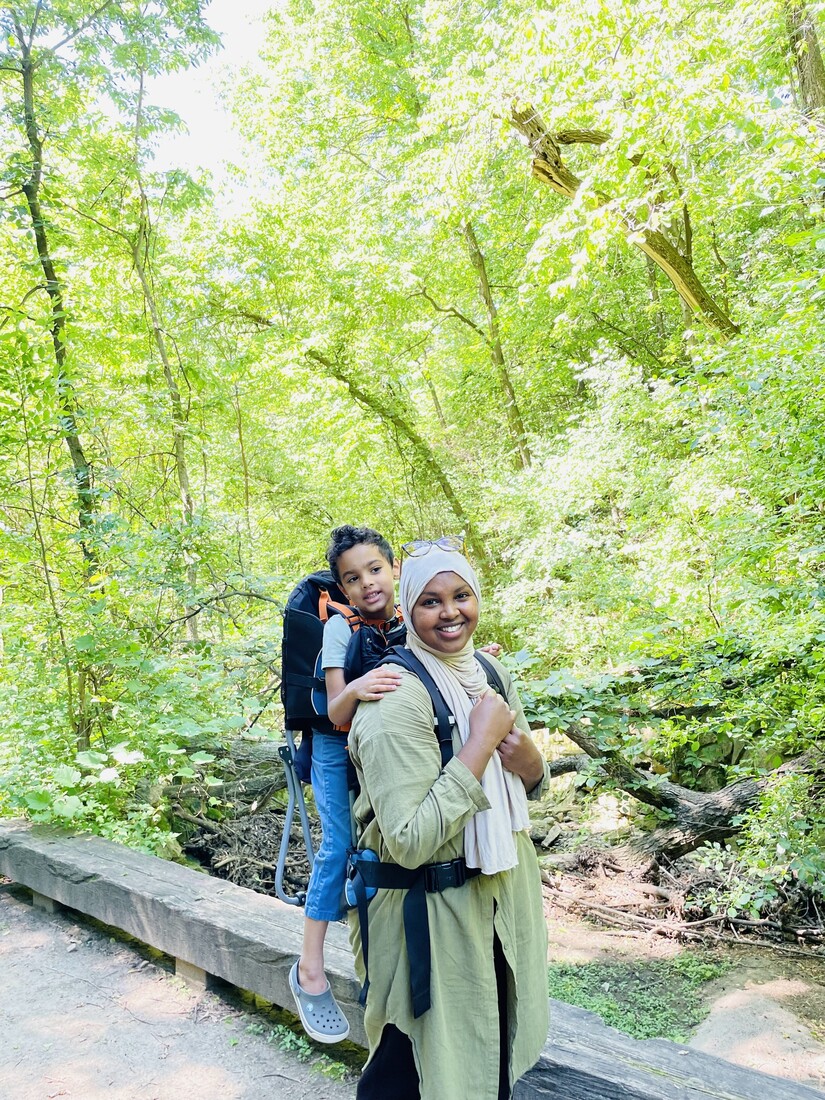
As soon as we had the logo, we updated all our social media platforms and WhatsApp groups. People loved it and said, "Whatever you put on that logo, I'm going to buy it!" That's how the merchandise started. The Women's Conference was approaching, and since I was on the board, someone suggested I get merchandise and table there. Within a month, I had to figure out how to source and produce everything. All our merchandise, like hoodies, is heat-pressed. My aunt, who does something similar, walked me through the process. The night before the conference, I was literally heat-pressing items because the merchandise, ordered from Turkey for modesty, was stuck in customs and arrived late. We had tote bags, raincoats, and water bottles. We sold out of many items at the conference, and that's how the business side began. None of this was planned; it just unfolded, guided by a higher power.
That fall, I approached REI and told them we had merchandise representing Muslim women in the outdoors, which they lacked. I brought samples, and they liked them. I fulfilled a wholesale order for their Minnesota locations, including tote bags and coffee cups. After that, I reached out to the other two REI locations, and they also stocked our products. The Robata Cultural Center, a Muslim women's bookstore and educational space, also expressed interest and now carries our items. The last place to get our merchandise was the Loppet Trail Head, and they specifically requested hijabs, so I created them for them. They're currently the only ones who have our hijabs.
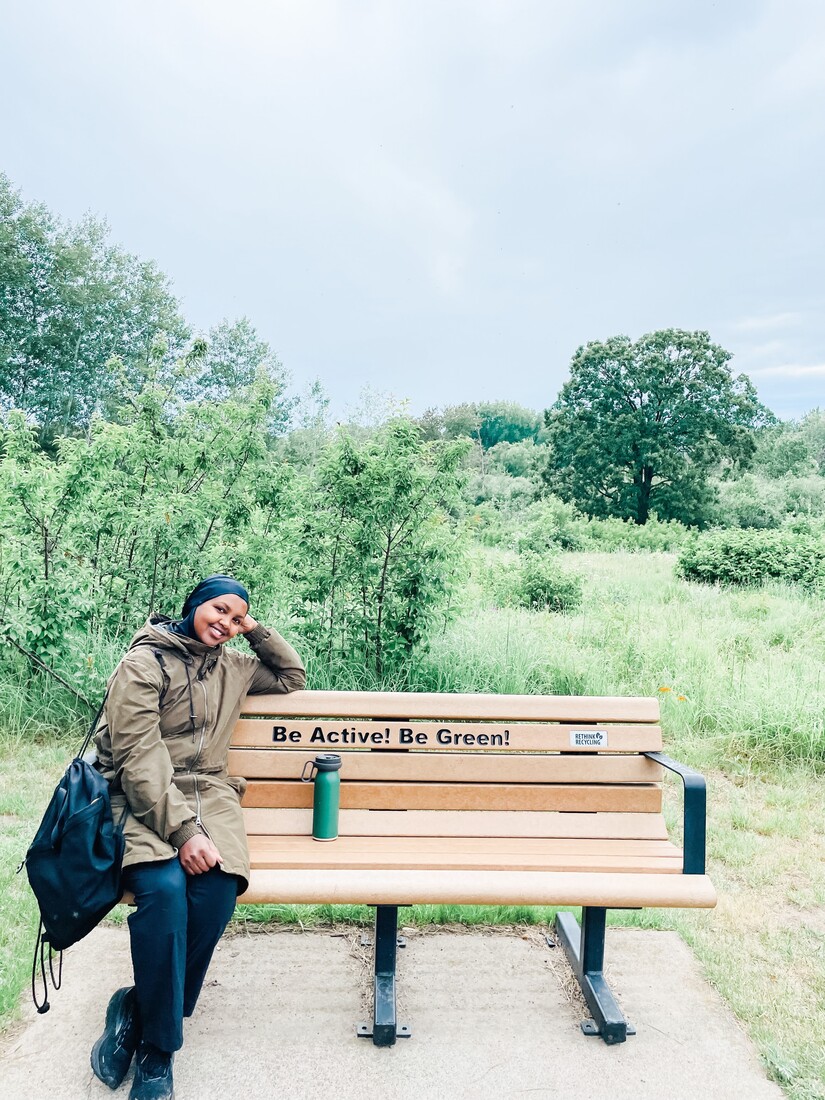
Right now, we're building an online website. A friend who works for New Vision, a non-profit that helps other non-profits with tech, connected me with a cohort of students whose final project was designing my website. They designed two websites for me: one for Eco Jariyah, which is the business side that encompasses Hiking Hijabie merchandise and Hiking Ummah. "Eco" means sustainability, and "Jariyah" means continuous charity. The hope is to donate a portion of our profits to climate-affected areas through orphan sponsorships and well-building. While we're not profitable yet, we aspire to reach a point where we can consistently donate a percentage of our profits. We've already built a well in a rural area of Pakistan for a masjid that lacked water access. It's named "Amanah Well" after our organization. It's incredible how what started as a simple idea to be outdoors has turned into a movement, a lifestyle!
Tom Akaolisa: How has your faith influenced your vision for Hiking Hijabie and Amanah Recreational Project, and how do you believe it empowers Muslim women to pursue outdoor activities and leadership roles?
Nasrieen Habib: I believe my faith has influenced everything I do. Islam isn't just a religion with specific acts of worship; it's a complete way of life, from the moment you wake up until you sleep, every action can be an act of worship. I didn't plan any of this; I've just been guided by my Creator's plans, listening to the passions and gifts He's given me and following them. Many people ask me how I thought of this, but I didn't sit down and strategize. While some people start businesses with that intention, and it can be successful, my intention was never purely to start a business. Your "why" sometimes needs to be more than just making money; it needs to be fulfilling for both this life and the afterlife. We believe this life is a test, and a way to pass it is by being of service to others as an act of worship.
You have to find what that service is for you. It could be journalism, and you have to do it in a way that goes beyond societal norms, doing it to seek God's pleasure. There have been times when people wanted me to do things that went against my principles, and I had to say no and remain strong, understanding my values. Ultimately, it wasn't about worldly gain or aspirations; it was, first and foremost, an act of worship.
I think that's why I've been able to do this for three years without any external funding. If I had started this purely as a business and it wasn't making money, I'd get exhausted and burn out, which happens to many people. Money is great and needed, but the work doesn't stop if it's not there because that's not why we started. As long as my livelihood doesn't depend on it—and thankfully, it does not, my husband is the breadwinner—it's a privilege to do this work without worrying about feeding my family from it. This allows me to do it with the sincerity it requires, always mindful that it is, first and foremost, an act of worship.
As for motivating Muslim women, the biggest motivation is for them to know that I'm also just figuring things out. I'm not an expert, but I'm like them. Let's figure it out together, and I'll share everything I learn. We use our religion to affirm what we're doing and find inspiration. We often discuss verses that talk about self-care and giving back. We have conversations about what it means to be outdoors as a way of reflecting on God's majesty and creation, and how we can better take care of it.
Our religion is also community-based, which makes it a magnetic force for people to come together. They see a safe space where they can participate in activities while upholding their values. For example, if it's prayer time, we pray together. In other groups, if you ask for certain things, like a water bottle for ablution (washing yourself for prayer), people might find it strange. But in our group, everyone understands. It's about being understood, valued, and validated. Being part of an in-group means you don't have to explain much; they understand your needs.
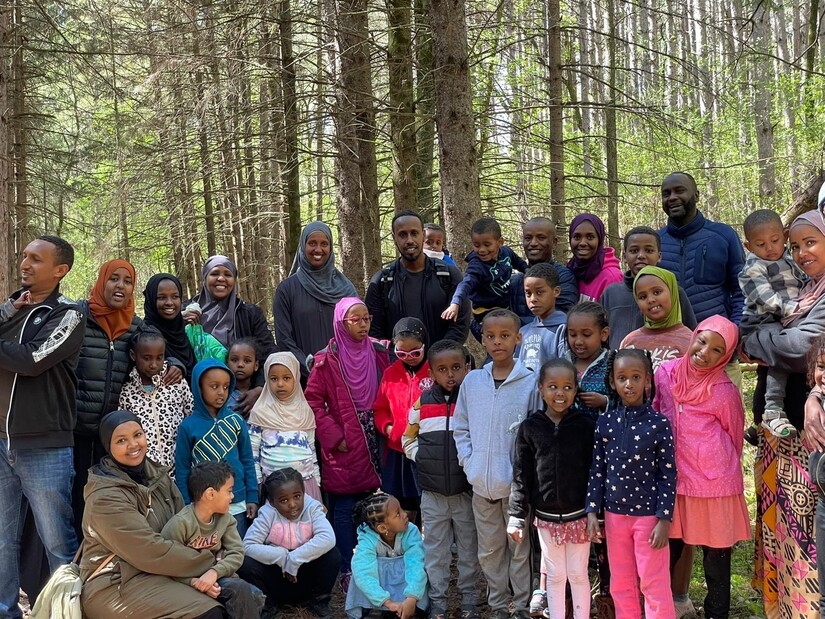
Tom Akaolisa: During International Women's History Month, we celebrate resilience. Can you discuss the unique challenges you've faced as a Muslim woman in outdoor spaces and how these experiences have shaped your mission?
Nasrieen Habib: The biggest challenge is the perceived challenge, or the challenge of simply feeling safe outside. For example, we have a "remembrance walk" that we do after morning prayer, sometimes as early as 4 AM in the summer. I often see predominantly white women running by themselves, but we can't do that. I can't be outside alone at that time, or even on a trail during the daytime, because I don't feel safe. We live in a country where it's possible for someone to be attacked just because of how they look or dress. We're visibly Muslim, and our headscarf can be a target. This feeling of insecurity, especially after the political climate around 2016, was one of the reasons the group was created. It's a privilege for other women to do what we can't. Even a Muslim woman who doesn't wear a hijab might be attacked for other reasons, like sexual assault, but not specifically because of how she chooses to worship her Creator.
So, we're mindful of where we live and take steps to ensure we're not unnecessarily exposing ourselves. We also advocate for change. Being on the board of RISE, a civic engagement organization, we helped pass a hate crime bill last year because these issues disproportionately impact people who look like us, whether in healthcare or other areas. For instance, I recently experienced a nurse practitioner falsely documenting that she performed exams and had conversations with me that never happened, including discussions about my BMI and encouraging weight loss. My doctor friend, who is also Somali American, confirmed this happens all the time. This highlights how we live in America, and spaces aren't always built with us in mind. We constantly advocate for inclusion and religious accommodations. We've been asking places like the V3 Sports to create women-only swimming programs because we can't swim with other genders or transgender individuals.
A lot of programming doesn't include us in its initial design; it's primarily created for non-Muslim women. As a practicing Muslim woman, it's hard to access programming that still values your relationship with your Creator and your worship, and truly includes you. My whole point is to have these conversations with all our partners, explaining what we need to feel accommodated and seen. If it's swimming, it means having all-women staff and lifeguards, and barriers from the rest of the gym. If it's kayaking, it means mostly women kayakers, because if you fall, a woman will pull you up. These things are crucial because we often can't have mixed-gender activities if it involves us being vulnerable and needing help from the opposite gender. Even for our bouldering project, we do it alone, not with Muslim brothers, because climbing can be exposing. We are very mindful of our programming, creating it for all Muslim women, especially the most practicing ones, because they are often the most excluded and struggle to find resources.
Tom Akaolisa: Hiking Hijabie offers modest activewear for Muslim women. How do you see this initiative as a celebration of cultural heritage and a means to encourage inclusivity in spaces traditionally dominated by men?
Nasrieen Habib: First and foremost, it doesn't only offer modest activewear; it offers cultural representation of Muslims in the outdoors. In addition to modest activewear, we have clothing that can be dressed up or down, from day to night. The whole point is for people to see images of Muslim women in the outdoors. That's why we put our logo on everything—from tote bags to coffee cups, blazers, and jean jackets—so people can feel proud to have a representation of Muslims in the outdoors.
Our logo doesn't represent a specific skin color because Muslim women come in all shapes, colors, and sizes. We want it to be very inclusive. The only thing in our logo that specifically identifies us as Muslim women is the hijab. While there are Muslim women who don't wear the hijab, and they are not excluded, there was a lack of representation for Muslim women who do wear the hijab in outdoor spaces.
We've seen mainstream brands try to represent us now that they see the market value and share of Muslim women's spending, especially in fitness. You've seen Nike, Adidas, Puma, and Lululemon all come out with products, but they often miss the mark because they aren't inclusive of every Muslim woman. The hijabs and products they create aren't suitable for all Muslim women; we have different hijab styles and modesty levels. So, we try to accommodate everyone, from the most modest to those who don't wear a hijab. Everyone is welcome and included. It's for Muslim women, by Muslim women, because we know our needs. Even though I don't wear the largest style of hijab or abaya workout clothes, I've created them because I know there are sisters who need them, and I don't want them excluded. We've even focused on size inclusivity in activewear, going up to 5XL. Many people are surprised, thinking we won't have their size, but we do. The point is, we know what it feels like to be excluded, and we don't want any Muslim sister to feel excluded in anything we do.
Tom Akaolisa: International Women's History Month is a time to honor progress. How have you observed Muslim women reshaping perceptions and influencing change in traditionally male-dominated outdoor environments?
Nasrieen Habib: We've seen Muslim women increasingly present in outdoor spaces, from participating in the Olympics to opening boxing gyms. We have a sister who went to the Olympics for boxing and won medals, and she's opening another boxing gym. We have women who are doing weightlifting, which was traditionally seen as a male activity, but we're changing that perception. It's incredibly beneficial for everyone. We have Muslim women runners, a sister who's a black belt in karate—not just in outdoor spaces, but across various fields.
In the outdoor realm specifically, we have Muslim women trekking and hiking Kilimanjaro. A friend of mine in the UK does solo hikes across the UK and other parts of the world, documenting and sharing her journeys while wearing a full hijab, skirt, and all her modest clothing. This is to show Muslim women that our hijab is not a barrier. It doesn't prevent us from doing anything that is permissible in Islamic law, and being outdoors is definitely one of those encouraged activities. There are Muslim women doing horseback riding and amateur sports.
These are activities we haven't historically seen Muslim women engage in widely, but we have seen Muslim women in leadership positions since the time of the Prophet peace be upon him. Our religion encourages Muslim women to be educated, to be leaders in their households and communities, and to use whatever leadership position they hold as an act of worship to give back. Muslim women had rights before many Western civilizations granted rights to their women.
I feel that often, people think we're oppressed because we choose to cover up. This is propaganda by the West to dehumanize us and enact a "savior complex," making them believe we are "less than." I recently watched Meryl Streep discussing how Afghani women had voting rights before French or American women, as early as 1919. We've had women scholars who contributed to astronomy, figuring out calculations about the Earth being round, and creating actual devices. We've had mathematicians and scientists. Muslim universities were built by Muslim women before even... back then, I feel like more Western civilizations were modest, and they changed; we did not. So, when you look back, women always covered up, women were always modest. It's an agenda that men have pushed, suggesting that to feel liberated or educated, you need to expose your body. No, it's the opposite.
The point is, we have always been in positions of leadership, always been educated, and had scholars, doctors, lawyers – all aspects of society. Islam encourages this, and our hijab is not a barrier. These are misconceptions spread by the West to put us down and make us feel like we should uncover just because that's what they've done to their women. Frankly, that's what it was. You see nuns, and they are respected, right? What's the difference between us and a nun? Absolutely nothing. The only difference is nuns are confined to the church, and we are not. God tells us that your act of worship isn't just sitting and praying all day. It's about being a good citizen, doing better for the community, being charitable, being a good employee, a good boss, a good human being, and using whatever resources He gave you to help His creation. Because on the Day of Judgment, He will say, "I was hungry, and you didn't feed me." And it's like, "How could I feed God?" But it's about the many opportunities you had to see people starving and whether you did something about it. That's the true test. It's not about all these other things people are occupied with.
Tom Akaolisa: Could you share a memorable story or experience from Hiking Hijabie that illustrates the transformative impact of outdoor activities on the lives of Muslim women?
Nasrieen Habib: Absolutely. Our group wouldn't have grown the way it did if Muslim women weren't interested in the outdoors. We have close to 900 women members, and almost a thousand in our overall community. In the Hiking Ummah group, we have about 400 members, with maybe 200 of them being men. So, we have about 1,100 to 1,200 members from this community in just three years, and the men's group was only added two years ago.
This shows that even if people aren't actively hiking yet, they love the idea of having a space they can come to. Many group members don't attend every hike; they opt into specific activities. But sometimes, people will come to me and apologize, saying, "I'm so sorry, I'm in your group chat, but I haven't been able to join." I probably know only about 50 to 100 of the women in our group chat; the other 700 or 800 I don't know, or I've only met once or twice. I also don't lead the hikes anymore; I have volunteers who do that. So, when they apologize, saying they have XYZ sickness, or their kids are busy, or whatever, it tells me that even if people don't have the time right now because this hasn't been a priority, it's something they want to do. And whenever they're ready, we want to make sure we're there for them. For those who are ready, we share pictures as a form of encouragement, allowing them to live vicariously, to see representation, and to see people who look like them doing things they felt they couldn't or wanted to do.
One memorable example was a girl when we went to Glacier National Park a couple of years ago. We've been to a few national parks already: Grand Canyon, Theodore Roosevelt, and Glacier. For that Glacier trip, I made it clear it would be primarily a hiking trip – hike, sleep, eat, hike. Participants needed to be physically able. One of the girls had a condition, but she really wanted to go. The day we were leaving—we drove from here, a group of seven of us in a van—her mom pulled me aside at 5 or 6 AM as we were packing. She told me her daughter had chronic health conditions that would impact her ability to walk long distances and required specific rest.
Initially, I was a little annoyed because I made sure everyone signed waivers, and I didn't want to be responsible. But then, seeing how she pushed herself – maybe she didn't know her mom spoke to me, or maybe she just really wanted this – it was like a once-in-a-lifetime opportunity for her. She probably would never have done it with her family or other groups due to accessibility challenges. For her, it was simply, "I don't care how sick I am or what pain I'm going through." We kept telling her, and the rest of the girls, that we needed to slow down and take breaks, especially during one challenging section, the Avalanche Lake hike, where we started late and were hiking back in pitch darkness, surrounded by water, with only flashlights.
I was so grateful she came because her presence made me realize how meaningful and impactful what I'm doing is. I'm creating a space for someone like her. Others who are physically able can go and do it themselves, but for her to do it in the safety of a group of Muslim sisters was an opportunity she wouldn't have had otherwise. When I hear stories like that, it motivates me even more to push boundaries and do more. That's why we're now adding adaptive kayaking for kids with special needs.
Tom Akaolisa: Adaptive kayaking?
Nasrieen Habib: Yes, adaptive kayaking. My son is on the spectrum, and we have many kids on the spectrum who drown because they want to experience water, and water is very calming for them. We want to give them that experience in a safe environment. So we're partnering with an organization called Paddle Bridge. They're also a sustainable business and receive grants from organizations like the Mississippi Watershed Management Organization. We've done kayaking with them for the past two years, and this coming year, we hope to add kayaking for kids on the spectrum and create more inclusivity for all our community members with special needs.
Tom Akaolisa: Wow, that's awesome. Thank you so much.
Tom Akaolisa: My last question is, what message would you like to share with Muslim women and their allies about the power of resilience and community in shaping a more inclusive future?
Nasrieen Habib: I think the biggest message is that we all want the same thing; we have more in common than differences. Our goal is to be in the outdoors, to feel included, and to protect nature. Ultimately, as long as we come together, our differences and experiences will help us reach that goal faster. We have one shared objective: to make the outdoors accessible and to care for it so it can last for future generations.
The best way to do that is to have people from different backgrounds, experiences, and faith groups come together and use their "why" to do the work. If you don't understand why you're doing something, you won't be sustainable in the long term. It has to be something intrinsically motivated. Finding your "why" has to be connected to something higher than yourself and higher than any worldly gain. Sometimes, volunteering can bring intrinsic fulfillment, contentment, and happiness. But for me, it goes beyond that.
Everyone has to find their "why" and hold onto it, using it as a compass. Remind yourselves whenever you feel lost: "This is why I'm doing this." It's not for me, or even just for future generations. For me, it's an act of worship. Everyone else has to figure out their "why"—it could be to make the world sustainable for future generations, or because it's the right thing to do. Find it, use it as your anchor, and always go back to it whenever you get lost.
Tom Akaolisa: Thank you so much. On this note, I thank you for sharing these insights with us. Thank you so much, and most importantly, for letting us get a view of the things you do. Thank you so much for how you impact society, and most importantly, how you encourage Muslim women to come out and actively take part in reshaping the environment and society. Because we are denying ourselves these valuable skills that Muslim women can provide to us, the lessons that they can provide to society in healing a lot of the ills that are going on around us. Thank you so much.
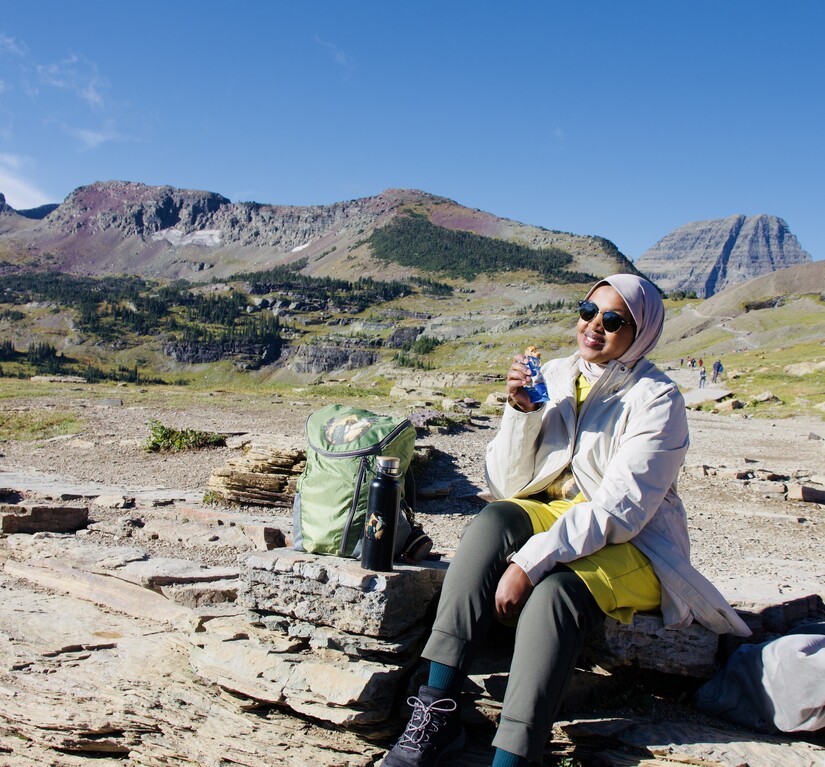
Nasrieen Habib: Thank you, I appreciate you giving us this opportunity. Thank you for taking the time to consider me for an interview. I appreciate it; it's an honor.
Tom Akaolisa: Would you be kind enough to let us interview you again in the future?
Nasrieen Habib: Absolutely, anytime!
Tom Akaolisa: Yes, thank you so much. And on that note, we come to the end of the conversation with Nasrieen Habib.